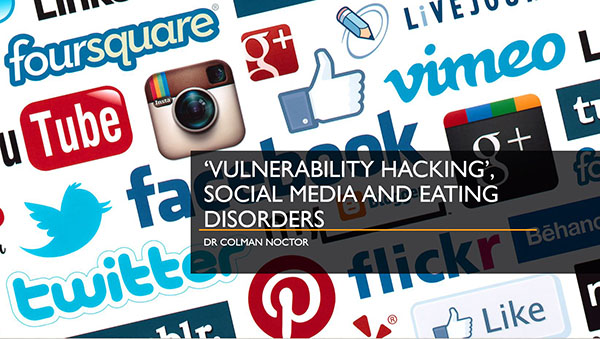
Dr Colman Noctor explores the impact of social media on body image and eating disorders.
The impact of conventional mass media on body image is well known and researched. Studies show that exposure, for example, to thin ideals increases our body dissatisfaction. In many cases, socialisation through mass media can encourage self-objectification and internalisation of the value of outward appearance and create standard culture stereotypes around body shapes and ideals.
While television, newspapers, magazines, music videos, and so on once formed traditional mass media and shaped these ideals, in the contemporary world, online spaces, and particularly social media, fill this role.
In this podcast, Dr Colman Noctor explains how social media has become the new means through which social norms and comparisons are created. Around the clock access to tools that allow us to produce as well as consume content significantly increases the opportunities for social comparison and dysfunctional surveillance of disliked body parts, and so on.
The interactive nature of social media indicates that it can have a more significant impact on social comparisons. This makes it fundamentally different to traditional mass media, as users are now producers, as well as consumers, of content. This changes not only how we interact with media, but how we interact with ourselves.
The cause of body image perception is complex; the media influences are just part of a host of interrelated factors. Our own personal vulnerabilities or pre-disposition can also play a part. The interaction of comparisons and our own vulnerabilities is where problems can emerge, as our search histories and online behaviours feed algorithms that, in turn, direct us to similar content. This personalisation can become problematic if the information being provided feeds a vulnerability. For example, people with low-self esteem, depression, perfectionism, unhealthy eating behaviours or an eating disorder, or people who believe in the centrality of appearance as a currency for self-worth may be more at risk.
An interesting outcome of research shows that, on social media, we are much more likely to compare ourselves to others who are like us than "iconic" ideals, so there is much more peer-to-peer influence. This can make comparisons more likely to feel hurtful when they're peer-to-peer.
When considering which comes first - social media or a vulnerability - Dr Noctor feels it's a mutual process. Social media can now "market" our vulnerabilities. We often search for sensitive things online, things we are embarrassed to ask friends about. The social media platforms or search engines we use collect that information to link us to more information. The goal of social media is personalisation: for Dr Noctor, personalisation can be persecutory if the data being given is about a vulnerability.
Hear more below on this relationship between social media, body image and eating disorders.
Continue to…
The legacy of Gerald Russell for eating disorders in 2020 and beyond